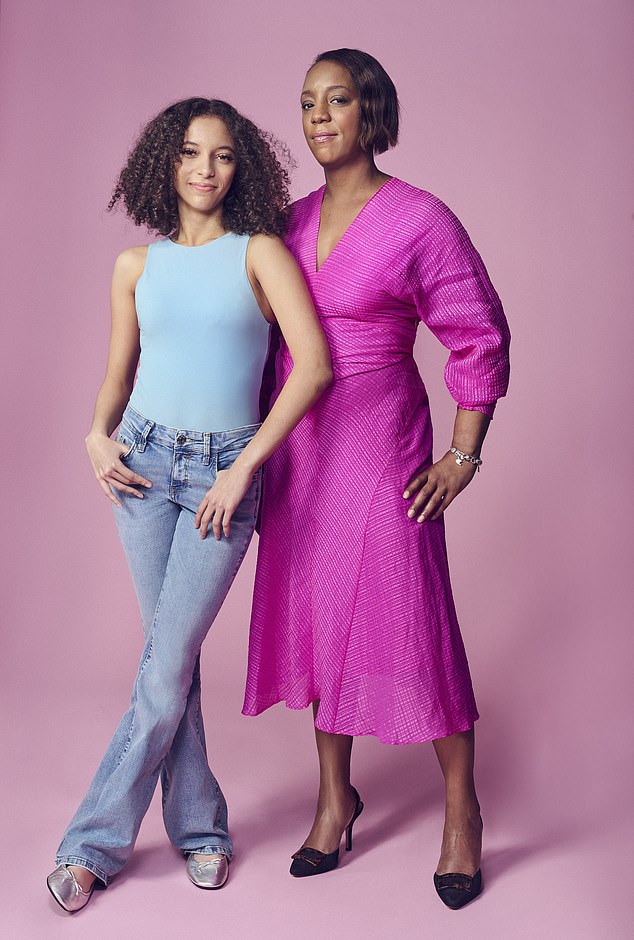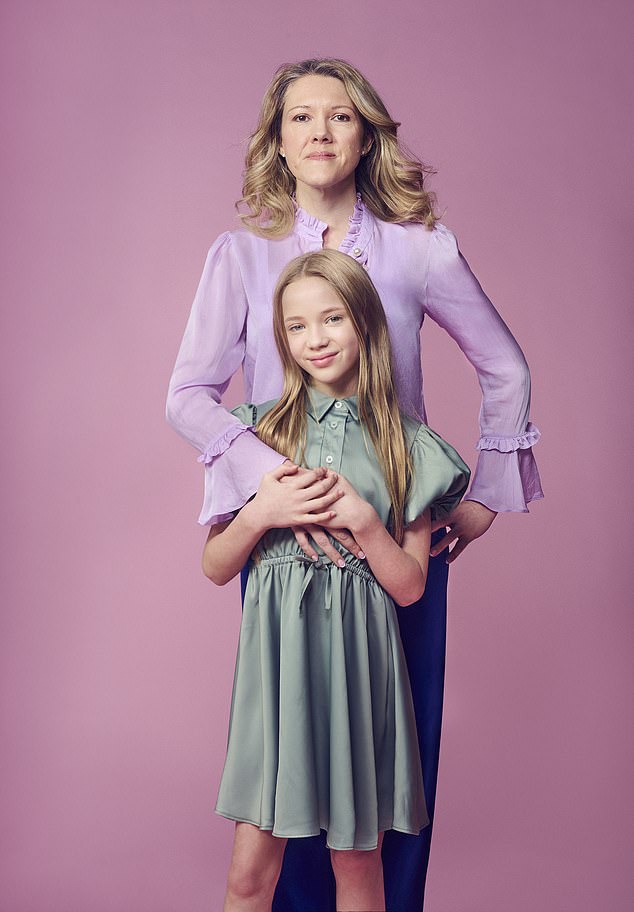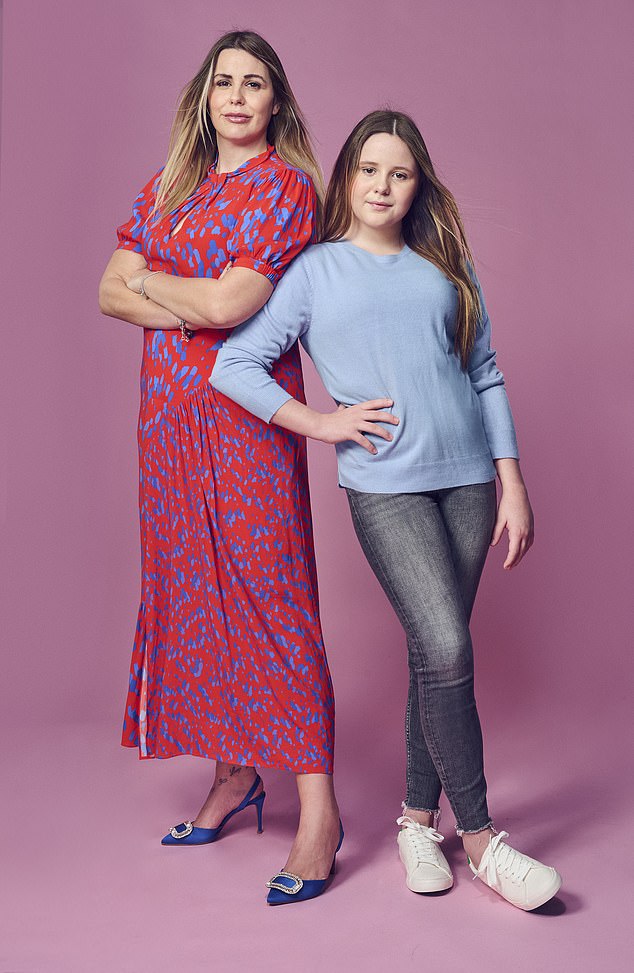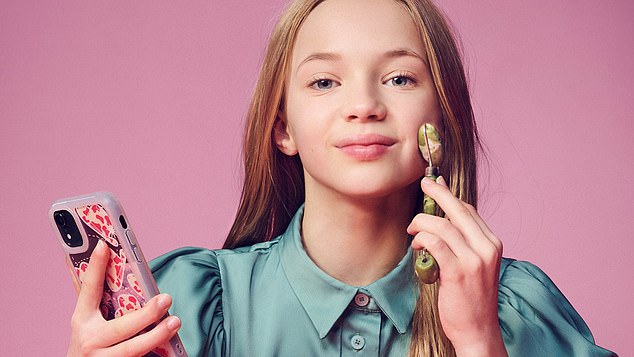When her alarm rings at 7am, Bella Bees springs out of bed to prepare for the day ahead. Before she even thinks of breakfast, she sits down at her vanity table to film herself getting ready for her TikTok followers.
Hers is a five-step routine involving all the latest anti-ageing products, including retinol eye cream (which, she says, stimulates collagen) and hyaluronic acid serum (to reduce lines).
It might cost £200 a month — she includes glycolic acid at night (‘to help remove the top layers of dead skin’) — but Bella is adamant it’s worth the expense to hold back time.
‘It’s an investment in my future self,’ she says. ‘These products are important to my life because I want to prevent ageing. Who would want wrinkles if there is a way to stop them?’ Not that she’s in danger of seeing the signs of ageing any time soon; Bella is only 13 years old. An age when most of us were content with soap and a splash of water, a first foray into moisturiser, at most.
But not so today’s tweens. Dermatologists are warning that children as young as ten are increasingly putting pressure on their parents to buy them expensive, anti-ageing skincare products — to the detriment of their young, sensitive skin.
Florence Marshall, aged 11, has a four-step skincare routine. ‘It takes me about 15 minutes to get my face ready for school,’ she says
SK:N Clinics Dermatologist Dr Aiza Jamil believes there is no need for it. She stresses that a skincare routine should typically only include cleansing, moisturising and a sunscreen — and cautions there are dangers when children use strong skincare ingredients.
‘The important thing to remember is that it’s only after the age of 25 that you start to see a decline in collagen, which can trigger the signs of ageing,’ she explains.
‘Before that you’re still growing and producing lots of collagen — so you just don’t need anti-ageing products. You’re not losing anything you need to replace.’
Dermatology nurse practitioner Louise Walsh agrees: ‘Young skin works efficiently by itself so shouldn’t need these ingredients. We need more “active” skincare as we age because the skin becomes lazy and less efficient at renewing itself and recovering from day to day stressors: heating, air-con, diet, pollution, sun exposure etc.

Layla Duffy, 16, who aspires to become a lawyer, took an interest in caring for her skin after getting acne. Her mother, Sheena Harewood, is relaxed about her daughter’s routine
‘Under-16s should avoid Retinoids and high concentrations of Vitamin C. Retinoids [of which retinol is a type] are too strong for younger skin and may cause irritation and will increase sensitivity to the sun.’
So how and why are children like Bella suddenly so interested in skincare they don’t need?
‘I know it must be hard for older people to get their head around the fact that I don’t want wrinkles,’ she says. ‘But I believe my routine will pay off later on in life. As for now, I don’t suffer from breakouts. My skin is very perfect, actually.’
It’s an approach taken by the many child influencers detailing their beauty routines on social media, such as 12-year-old Ruby Alexis, whose ‘get ready with me’ skincare routine videos have racked up more than 1.2 million likes.
Then there’s the enticing packaging. Celebrity-favourite skincare brand Drunk Elephant is known for its brightly coloured aesthetic and cute product names, such as the best-selling Lala Retro Whipped Cream (a moisturiser to you and me) which contains fermented green tea to combat signs of ageing, though the brand says this product is safe for kids and tweens to use.
The brand, which has 1.2 million followers on TikTok, has recently faced criticism for attracting children to its products. But have they gained this younger client base by design?
Founder Tiffany Masterson disagrees. ‘I’ve been reading that I chose the colours and packaging to target children. This couldn’t be further from the truth and the truth is never as interesting, but I chose the colours and packaging because it happened to be my aesthetic,’ she has said.
In a post on the brand’s Instagram account, it was also stated: ‘Many of our products are designed for all skin, including kids and tweens. First, I would say stay away from our more potent products that include acids and retinols — their skin does not need these ingredients quite yet.’

Andrea, 41, (pictured with her daughter Florence) worries about the mixed messages around young skin. ‘It does leave me feeling that girls my daughter’s age could be exploited by clever marketing campaigns,’ she says.
Samantha Sykes has spent 15 years managing a high-end beauty store and has seen her customer demographic change dramatically over the past year-and-a-half.
‘Before our average customer was mid-30s,’ she says. ‘Suddenly we are seeing girls as young as eight or nine, dragging their mums with them to pay for their luxury skincare.
‘They are asking for creams they don’t need at their age, which typically cost upwards of £50 per item.
‘Our policy is not to sell them products with 1 per cent retinol. Those strong retinol creams can cause severe irritation to the skin if used incorrectly, especially around the eyes. These children have no idea what they’re using or how to use it and could harm their skin. While TikTok has a lot to answer for, their mums will often still go ahead and purchase it for them. It’s madness.’
Bella, who has an older sister, aged 16, and three younger sisters, aged 11, eight and seven, says her grandmother introduced her to skincare. ‘I was about 12 when my gran told me to start looking after my skin,’ she says. ‘She gave me some moisturiser and said that as my older sister has spots, she was worried my skin was going the same way.’
Bella’s skincare collection now includes rose-based micellar water to cleanse, The Ordinary Glycolic Acid 7% Toning Solution, a retinol eye cream, followed by Beauty Pie Triple Hyaluronic Acid anti-ageing serum with ‘plumping idealift’.
She had to ditch one oil-based moisturiser which made her skin ‘greasy’. But as well as the cost to the complexion, there’s the financial hit.

Hannah Bees (pictured with her daughter Bella, 13) says ‘there is so much pressure’ from her children to keep looking young
‘I get £10 a week pocket money, which doesn’t go far, but I manage to find cheaper items on sites such as eBay and Vinted because they’re massively discounted. If I go into town with my friends, I go to the stores where they’ll give you samples.
‘None of us want wrinkles. I want to look my best, I don’t want to age. Now is the best time to start caring for our skin.’
Bella has no qualms about undergoing surgery or so-called tweakments in future, either.
‘My gran has filler and Botox. I’d definitely consider both especially Botox as it makes you look pretty.’
Her healthcare worker mother, Hannah Bees, 33, says: ‘My girls have better skincare routines than me. There are times I catch myself thinking, “Should I be doing it too?” From a parent’s perspective, it’s hard because they expect me to look a certain way.
‘They compare me to other mothers and I don’t want to embarrass them. There’s so much pressure.’
That said, she admits her own routine is confined to an Aldi moisturising day and night cream.
‘My eldest daughter has developed spots on her face and no matter how many times I explain to her it’s because her skin can’t breathe under everything she puts on it, I might as well be talking to the wall. No matter how often I explain to them that what they see online isn’t real life, I fear they’ve had this instilled into them. They’re obsessed.’
Even where young girls aren’t using products containing specific anti-ageing ingredients such as retinol, their skincare routines are incredibly involved for their age.
Florence Marshall’s hobbies include dance, acrobatic gymnastics, yoga classes — and a ‘regular day and night skincare routine’ that involves four different steps.
The 11-year-old, from Herefordshire, explains: ‘I cleanse my face twice because everyone does a double-cleanse. I then use a roller and face massager. The jade roller unblocks pores and stimulates blood flow in your face. One of my friends recommended it. It takes me about 15 minutes to get my face ready for school — it’s quite quick. At the weekends, I will spend 20-25 minutes.’
At a cost of about £85 a month, Florence’s focus on skincare began when she discovered Instagram influencer Madi France, who at the grand old age of 13 reviews skincare products and has 65,000 followers.
‘Before, I had red skin around my nose and also spots by my ears and chin. Now once a month I use Body Shop Vitamin C liquid peel and Vitamin C face mask. I have sensitive skin so I am careful about which brands to use.’
She adds: ‘I use Florence By Mills Swimming Under The Eyes Gel Pads costing £34 for 60 pads. They’re nice and gentle for my skin. They get rid of bags and de-puff my eyes.’
Do 11-year-olds worry about puffy eyes? ‘I usually get bags under my eyes if I haven’t had enough sleep or I’ve been drinking tea, then I’ll do a Love You Latte face mask,’ Florence explains. ‘It’s supposed to ensure my skin retains moisture all day.’
Florence’s mum, Andrea, 41, who works for a Multi-Academy Trust, worries about the mixed messages around young skin. ‘It does leave me feeling that girls my daughter’s age could be exploited by clever marketing campaigns,’ she says.
‘Florence would use a lot more products if I allowed her.
‘Some companies are presenting them as ‘healthy’ — which is something Florence’s age group are interested in. They don’t realise the fact they are often designed for adults means that they’re not necessarily ‘healthy’ for their own skin.’
Florence has taken to posting her complex routine online, achieving 1,900 views for her latest video within nine days.
‘Her other videos she made were of her playing with her Sylvanian families,’ says Andrea. ‘But there is clearly an appetite for these sorts of videos at the moment.’
Experts fear that the influx of tween and teen ‘influencers’ are doing more harm than good.
Psychotherapist and anxiety expert Kamalyn Kaur says: ‘Placing such a heavy focus on skincare at such a young age can instill the belief that their natural appearance is inadequate.
‘This in turn fosters unrealistic beauty standards, which negatively impact self-worth. It is also conditioning young children to believe that there is something wrong with ageing.’
Sheena Harewood, 48, who works in customer service, admits to feeling relaxed about her 16-year-old daughter’s interest in skincare. She says: ‘I’m laid back about what she uses, even though she did try a charcoal product once which didn’t go well.
‘Her skin reacted badly to the product and she looked like she’d been slapped.’
Her daughter, Layla Duffy, who aspires to become a lawyer, was 13 when she started caring for her skin after getting acne: ‘I saw one doctor but their attitude was ‘you’ll grow out of it’ so I had to work out what products to use on my own.’
As a result, Layla now uses a variety of soaps, gels, toners and creams, including a Vitamin C serum and a retinol serum.
‘Children might think they are future-proofing their skin,’ says dermatologist Dr Aiza Jamil.
‘But using anti-ageing products too early can cause long-term damage to the skin barrier, making you prone to spots, photosensitivity and allergic reactions.
‘In short, it can invite more problems than it solves.’

